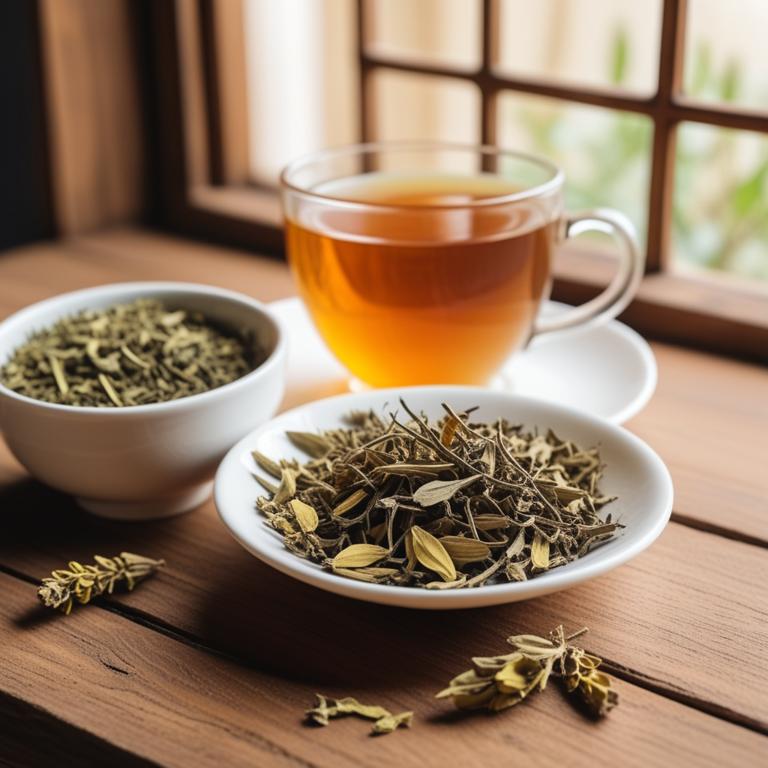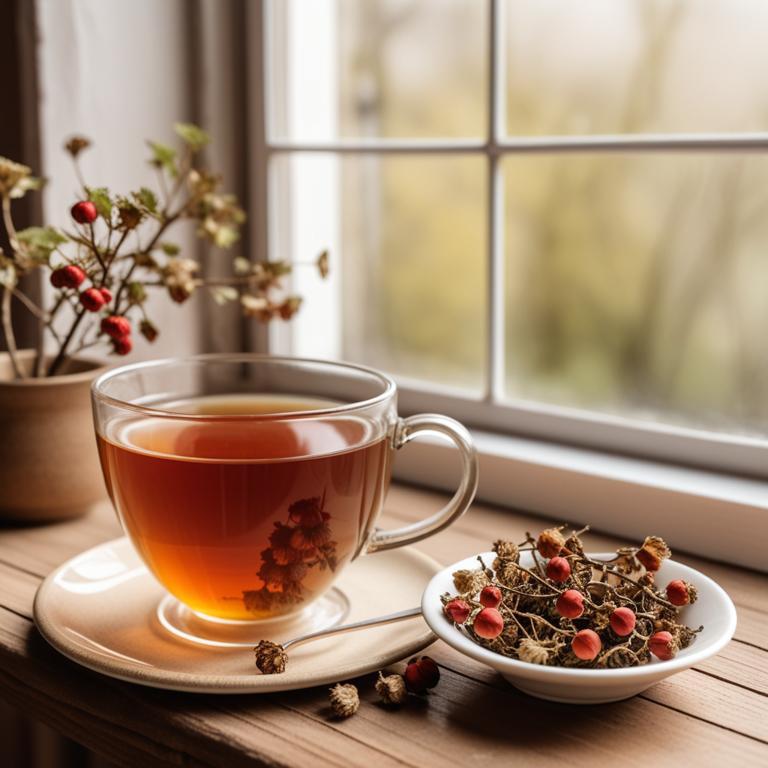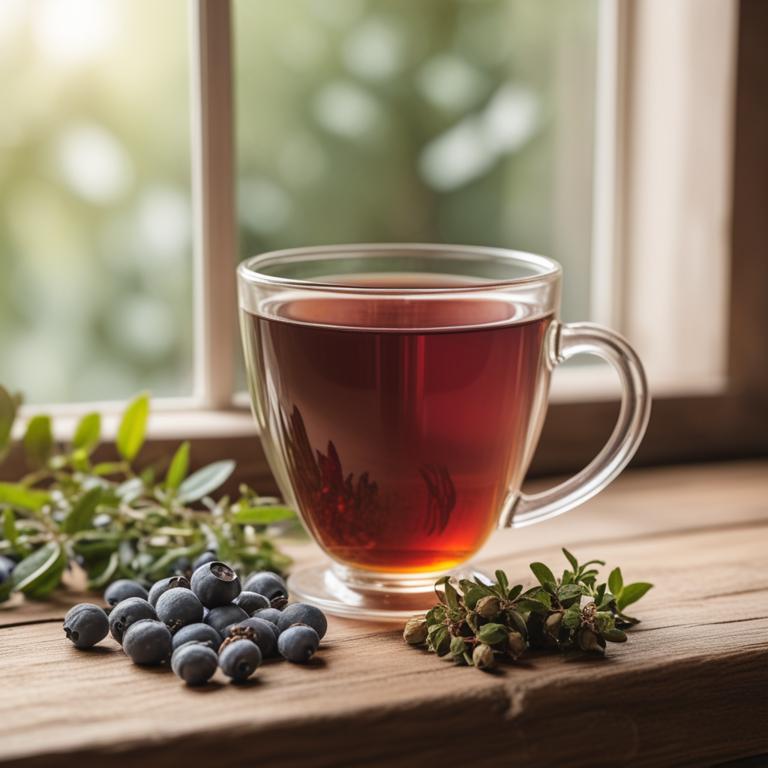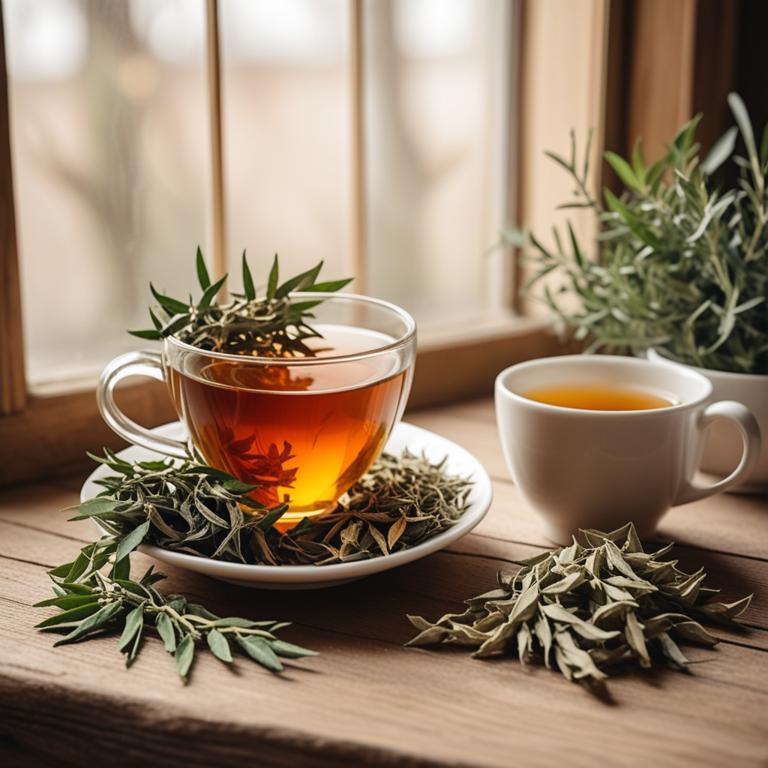9 Herbal Teas For Overactive Bladder

Herbal teas can be a helpful way to manage overactive bladder symptoms.
Overactive bladder is a condition where the bladder muscles contract too often, leading to sudden urges to urinate. Herbal teas can help by relaxing the bladder muscles and improving bladder control. One example is Urtica dioica, also known as stinging nettle, which has been shown to reduce bladder contractions and improve symptoms.
Glycyrrhiza glabra, or licorice root, has anti-inflammatory properties that can help soothe the bladder and reduce spasms. Zingiber officinale, or ginger, has a calming effect on the body and can help reduce stress and anxiety, which can contribute to overactive bladder symptoms. Drinking these herbal teas can bring benefits to your daily life, such as reduced frequency of urination, improved sleep, and increased confidence. You can try drinking a warm cup of herbal tea before bedtime to help relax your bladder and get a good night's sleep.
You can also try drinking a cup during the day to help manage symptoms and reduce the need to rush to the bathroom.
- 1. Urtica dioica
- 2. Glycyrrhiza glabra
- 3. Zingiber officinale
- 4. Crataegus monogyna
- 5. Melissa officinalis
- 6. Valeriana officinalis
- 7. Vaccinium myrtillus
- 8. Ruscus aculeatus
- 9. Cassia auriculata
1. Urtica dioica

Urtica dioica teas contains compounds like quercetin, kaempferol, and rutin, which have anti-inflammatory properties.
These flavonoids help reduce irritation and inflammation in the bladder, alleviating discomfort and spasms associated with overactive bladder. The plant's diuretic properties also aid in regulating urine flow, allowing the bladder to function more efficiently. Additionally, the tea's antioxidant properties help protect the bladder lining from damage, promoting a healthier environment for normal bladder function.
By reducing inflammation and promoting a balanced bladder environment, Urtica dioica teas may help alleviate symptoms of overactive bladder.
- Gather 1 cup of fresh Urtica dioica leaves or 1 teaspoon of dried leaves.
- Add 1 cup of boiling water to the leaves in a heat-resistant cup or teapot.
- Steep the leaves for 5-10 minutes, then strain the liquid.
- Add honey or lemon to taste, if desired. Drink 1/2 cup, 2-3 times a day.
- Consult a healthcare professional before using Urtica dioica tea for overactive bladder treatment.
2. Glycyrrhiza glabra

Glycyrrhiza glabra teas contains compounds like glycyrrhizin and flavonoids that have anti-inflammatory and antioxidant properties.
Glycyrrhizin has been shown to relax the muscles in the bladder, reducing urgency and frequency of urination. Flavonoids, specifically quercetin, help to improve blood flow to the bladder and reduce muscle spasms. The soothing properties of these compounds may also help to reduce stress and anxiety, which can exacerbate overactive bladder symptoms.
By relaxing the bladder muscles and reducing inflammation, Glycyrrhiza glabra teas may help to provide relief from overactive bladder symptoms.
- Gather 1 tablespoon of dried Glycyrrhiza glabra root and 1 cup of boiling water.
- Steep the Glycyrrhiza glabra root in the boiling water for 5-7 minutes.
- Strain the tea into a cup and discard the root.
- Add honey to taste, if needed, and drink the tea 1-2 times a day.
- Drink at least 8-10 cups of water throughout the day to stay hydrated.
3. Zingiber officinale

Zingiber officinale teas contains active constituents like gingerols and shogaols, which have anti-inflammatory and antispasmodic properties.
These properties help relax the muscles in the bladder and the urinary tract, reducing the frequency and urgency of urination. Gingerols also have a direct effect on the bladder muscle, causing it to contract and then relax, which can help control overactive bladder symptoms. Additionally, the anti-inflammatory properties of gingerols can reduce inflammation in the urinary tract, which may contribute to overactive bladder.
By drinking Zingiber officinale teas, some people have found relief from overactive bladder symptoms, possibly due to the combination of its relaxing and anti-inflammatory effects.
- Gather 1 teaspoon of dried Zingiber officinale root, 1 cup of boiling water, and a strainer or tea infuser.
- Place the dried root in the strainer or tea infuser.
- Pour the boiling water over the root, and let it steep for 5-7 minutes.
- Strain the tea into a cup, and discard the root.
- Drink 1 cup of the tea 2-3 times a day, as needed, to help manage overactive bladder symptoms.
Zingiber Officinale Tea on Amazon
FGO Organic Ginger Tea, 100 Count, Eco-Conscious Tea Bags, Caffeine Free, Packaging May Vary (Pack of 1)
Disclaimer: We earn a commission if you click this link and make a purchase at no additional cost to you.
4. Crataegus monogyna

Crataegus monogyna teas contains a mix of flavonoids, particularly epicatechin and quercetin, which have antioxidant properties that help relax the muscles in the bladder.
The tea also contains proanthocyanidins, which can strengthen the muscles that control the flow of urine. The flavonoids and proanthocyanidins work together to reduce inflammation and improve the function of the bladder muscles, helping to manage symptoms of overactive bladder. The tea's active constituents, including epicatechin and quercetin, can also help reduce the frequency and urgency of urination by improving the bladder's ability to store urine.
By relaxing the muscles and improving bladder function, Crataegus monogyna teas may help alleviate symptoms of overactive bladder.
- Gather ingredients: 1 teaspoon of dried Crataegus monogyna leaves, 1 cup of boiling water, and a tea infuser or strainer.
- Measure 1 teaspoon of dried Crataegus monogyna leaves and place them in a tea infuser or strainer.
- Pour 1 cup of boiling water over the leaves and let it steep for 5-7 minutes.
- Strain the tea into a cup and discard the leaves. Add honey or lemon to taste, if desired.
- Drink the tea 2-3 times a day, as needed, to help manage overactive bladder symptoms.
5. Melissa officinalis

Melissa officinalis teas contains rosmarinic acid, apigenin, and linalool as its key bioactive constituents.
These compounds have anti-inflammatory and antioxidant properties that may help soothe the bladder and reduce inflammation in the urinary tract. The antispasmodic properties of linalool and apigenin in Melissa officinalis teas can also help relax the muscles in the bladder and urethra, reducing the frequency and urgency of urination. By promoting a healthy balance of gut bacteria, rosmarinic acid can also help reduce symptoms of overactive bladder.
Regular consumption of Melissa officinalis teas may help alleviate symptoms of overactive bladder by promoting a calm and relaxed bladder environment.
- Gather 1 cup of fresh Melissa officinalis leaves or 1 tablespoon of dried leaves.
- Heat 1 cup of water in a pot until it starts boiling.
- Add the Melissa officinalis leaves to the boiling water and let it steep for 5-7 minutes.
- Strain the tea into a cup and discard the leaves. Let it cool for a few minutes.
- Drink 1/2 cup to 1 cup of the tea 2-3 times a day as needed to help manage overactive bladder symptoms.
6. Valeriana officinalis

Valeriana officinalis teas contains a range of bioactive compounds, including valerenic acid, isovaleric acid, and valeranone.
These compounds have a relaxing effect on the body, which can help to reduce muscle spasms in the bladder. The valerenic acid and isovaleric acid also have anti-inflammatory properties, which may help to soothe and calm the bladder muscles. Additionally, Valeriana officinalis teas have a sedative effect, which can help to calm the nervous system and reduce the frequency of urination.
This can be beneficial for people with overactive bladder, as it can help to reduce the number of times they need to urinate during the day.
- Gather 2 teaspoons of dried Valeriana officinalis root and a cup of boiling water.
- Put the dried root in a tea infuser or a heat-resistant cup.
- Pour the boiling water over the root and let it steep for 5-7 minutes.
- Strain the tea into a cup and discard the root.
- Drink the tea 30 minutes before bedtime to help manage overactive bladder symptoms.
7. Vaccinium myrtillus

Vaccinium myrtillus teas contains bioactive constituents such as anthocyanins and flavonoids, which have antioxidant and anti-inflammatory properties.
These compounds help to reduce inflammation in the bladder and improve its function, making it a potential solution for overactive bladder. The anthocyanins in Vaccinium myrtillus teas also have a relaxing effect on the bladder muscles, which can help to prevent sudden and frequent urination. Additionally, the flavonoids in the tea may help to improve bladder control and reduce symptoms of overactive bladder by promoting the contraction and relaxation of the bladder muscles.
By reducing inflammation and promoting healthy bladder function, Vaccinium myrtillus teas may provide relief for those experiencing overactive bladder symptoms.
- Gather 1 cup of fresh Vaccinium myrtillus (blueberries) leaves or 1/2 cup dried leaves.
- Add 250ml of boiling water over the leaves in a cup.
- Steep for 5-7 minutes, then strain the liquid using a fine-mesh sieve or cheesecloth.
- Add 1 tablespoon of honey (optional) to the tea, if desired.
- Drink the tea 1-2 times a day, after consulting with a healthcare professional for overactive bladder treatment.
8. Ruscus aculeatus

Ruscus aculeatus teas contains boiactive constituents like ruscogenins and ruscic acid.
These compounds help relax the muscles in the bladder and the urethra, allowing for better control and reducing the urge to urinate frequently. Ruscogenins have a soothing effect on the smooth muscle cells, which can become overactive and cause bladder spasms. Ruscic acid has a diuretic effect, but it also helps reduce the frequency of urination by increasing the capacity of the bladder.
By relaxing the muscles and reducing bladder spasms, Ruscus aculeatus teas can provide relief from overactive bladder symptoms.
- Gather 1 cup of fresh Ruscus aculeatus leaves and flowers.
- Wash the leaves and flowers with cold water to remove dirt and impurities.
- Steep 1 tablespoon of the leaves and flowers in 1 cup of boiling water for 5-7 minutes.
- Strain the tea into a cup and discard the solids.
- Drink 1 cup of the tea 2-3 times a day, as needed to help manage overactive bladder symptoms.
9. Cassia auriculata

Cassia auriculata teas contains bioactive constituents such as flavonoids, alkaloids, and saponins.
These compounds have been shown to have a relaxing effect on the muscles in the bladder and the urinary tract. The flavonoids, particularly flavonoid glycosides, have been found to have a diuretic effect, which helps to increase urine production and reduce the likelihood of bladder overactivity. The alkaloids, including cassiauriculatin, have been shown to have a calming effect on the muscles in the bladder, reducing muscle spasms and contractions.
By relaxing the muscles and increasing urine production, Cassia auriculata teas may help to alleviate symptoms of an overactive bladder.
- Gather 1 cup of fresh Cassia auriculata leaves or 1 teaspoon of dried leaves.
- Boil 1 cup of water in a pot. Remove from heat when boiling.
- Add the gathered Cassia auriculata leaves to the boiling water. Let it steep for 5-7 minutes.
- Strain the tea into a cup using a fine mesh sieve or cheesecloth. Discard the leaves.
- Drink the tea 2-3 times a day, as needed, to help manage overactive bladder symptoms.